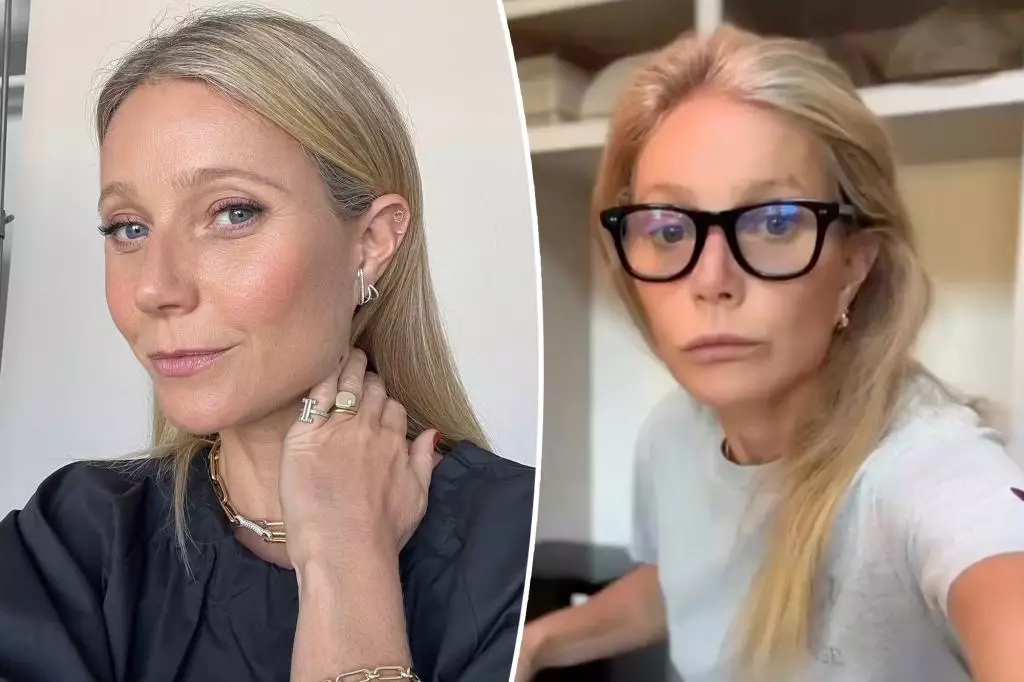In an era driven by social media’s relentless pursuit of perfection, celebrity transformations often serve as a mirror reflecting society’s obsession with youth and flawless beauty. Gwyneth Paltrow, a figure long associated with elegance and natural sophistication, recently became the subject of online speculation due to her seemingly altered facial features. Her fuller lips, prominently showcased in a casual cooking video, sparked a wave of curiosity—and controversy. The reactions ranged from admiration to outright criticism, revealing society’s complex relationship with female beauty standards. The episode underscores a broader cultural issue: the superficial pressures women face to conform to unrealistic ideals, often at the expense of authenticity.
This incident also highlights how digital platforms amplify visibility, making even minor physical changes the focus of public discourse. Whether intentional or not, Paltrow’s altered appearance reignited debates about cosmetic enhancement, authenticity, and honesty. By scrutinizing her image so obsessively, society exposes its uncomfortable double standards—expecting women to age gracefully, but also to maintain a perpetually youthful visage. Ultimately, this double bind suggests that for many, beauty continues to be a performance rather than an expression of genuine self.
Beauty as a Personal Choice Versus Societal Pressure
Gwyneth Paltrow’s candidness about her use of cosmetic procedures provides a rare glimpse into the nuanced reality faced by many women. Her previous openness—admitting to Botox and Xeomin treatments—demonstrates a level of vulnerability that challenges the shame often associated with cosmetic enhancement. Unfortunately, her recent appearance, though possibly a result of routine cosmetic procedures, has been met with harsh judgment. Critics question her honesty, alleging she’s hiding her modifications to promote her lifestyle brand.
Such scrutiny reveals the societal tendency to scrutinize women more than men when it comes to their appearance. Men who undergo cosmetic procedures often face less criticism; women, however, are held to an impossible standard of natural beauty, where any deviation from aging “gracefully” is seen as a betrayal of authenticity. Paltrow’s experience underscores her internal conflict: she embraces her choices but is still victimized by the judgmental gaze of society. Her honesty about getting treatments demonstrates her recognition of beauty as a personal choice, yet her social environment continues to pressure her into silence.
Reclaiming Self-Expression in a Culture of Judgment
The public’s polarized response to Paltrow’s appearance underscores the importance of challenging societal norms that equate worth with physical perfection. Critics who dismiss her without understanding the nuances of cosmetic procedures reinforce a culture that stigmatizes women for taking control of their bodies. Meanwhile, others defend her, emphasizing the danger of fostering an environment where women feel they must hide or deny their authentic selves to appease societal expectations.
Rather than perpetuating superficial judgments, society should start acknowledging that beauty is inherently diverse and fluid. Gwyneth Paltrow’s willingness to openly discuss her choices can serve as a catalyst for fostering honest conversations about aging, self-care, and body autonomy. Her evolving appearance—whether natural or enhanced—should not diminish her achievements or her voice. By shifting focus from superficial perfection to deeper qualities like talent, intelligence, and authenticity, society can begin to dismantle the toxic standards that pressure women into relentless self-surveillance.
The controversy surrounding Gwyneth Paltrow’s recent appearance is more than just gossip; it exposes the underlying societal obsession with youth and appearance. Her openness about cosmetic procedures challenges the stigma and invites viewers to reconsider narrow beauty standards. It’s time to view women not through the lens of superficial perfection but as complex individuals with the right to shape their identities freely.
Authenticity, courage, and self-acceptance should be celebrated, not punished. Gwyneth Paltrow’s experience reminds us that true beauty lies beyond physical alterations—it is rooted in confidence, honesty, and self-love. As society evolves, embracing genuine self-representation can pave the way for a culture that values women for who they are, not how they appear. The path forward demands courage—both from women who choose to enhance their looks and from those willing to accept that true beauty transcends surface-level appearances.

